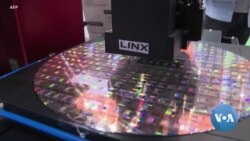Japan imposes export controls on advanced microchip technologies, following the U.S. and the Netherlands in moves widely seen as targeting China.
Welcome to VOA Asia Weekly. I'm Chris Casquejo in Washington. That story is just ahead, but first, making headlines:
In an abrupt change, Chinese state media announced on Tuesday that Foreign Minister Qin Gang has left his post after a one-month absence. His replacement is top diplomat Wang Yi. Qin was appointed foreign minister in December after serving less than two years as ambassador to the U.S.
Cambodian Prime Minister Hun Sen, one of the world's longest-serving leaders, announced Wednesday that he will resign in three weeks. He is passing power directly to his oldest son, Hun Manet, chief of the country's military who won his first seat in parliament on Sunday. Hun Sen’s 38 years of hardline rule have been marked by stifling opposition groups and freedom of expression.
The World Food Program says that 17 percent of Sri Lankans, or nearly four million people, still face food insecurity. A bailout package of about $3 billion from the International Monetary Fund in March helped remove the island country’s “bankrupt” tag. But it came with tough conditions that require imposing higher taxes and steep cuts to government spending and welfare programs.
Malaysia’s prime minister, Anwar Ibrahim, said he and visiting Philippines President Ferdinand Marcos Jr. have agreed on the need to strengthen the role of the Association of Southeast Asian Nations in ending violence in Myanmar.
U.S. Defense Secretary Lloyd Austin said during a visit Thursday that the U.S. is not seeking a permanent base in Papua New Guinea. Meanwhile, U.S. Secretary of State Antony Blinken visited the kingdom of Tonga Wednesday, as the United States continues to increase its diplomatic efforts in the region to counter China's growing influence.
Fiji's prime minister, Sitiveni Rabuka, canceled his visit to China after tripping and falling while looking at his phone and injuring his head. In a minute-long video posted to social media sites, he highlighted the blood spattered on his shirt and a small bandage on his head.
Japan imposed export controls on advanced microchip technologies this week, mirroring recent moves by the United States and the Netherlands. As Henry Ridgwell reports for VOA from Tokyo, the controls are widely seen as targeting China.
Japan has listed twenty-three types of semiconductor technology that are now subject to export restrictions.
They include advanced microchip manufacturing equipment – such as machines that deposit films on silicon wafers, to devices that etch out the microscopic circuits of chips.
The move will impact China’s ability to make advanced chips, says analyst Yoshiaki Takayama.
“Because the number of companies with the capacity to manufacture cutting-edge chips is extremely limited, the Japanese measure makes it difficult for China not only to import advanced chips, but also to manufacture them.”
The United States banned the export of some advanced microchips and semiconductor manufacturing technology to China last October. The Netherlands - another key producer of semiconductors – has also imposed export restrictions.
Washington says it wants to stop Beijing from using the technology for military purposes.
At the May G7 summit in Japan, allies agreed on the need to ‘de-risk’ from potential Chinese economic coercion – and avoid becoming reliant on China for semiconductor technologies.
“So, China's advanced semiconductor manufacturing capacity will not grow, at least in the short to medium term.”
Japan did not name China as the target of its export restrictions, which apply to 160 countries in total. But Beijing reacted with anger.
“In disregard of China's serious concerns, Japan insisted on making and implementing export control measures that are clearly aimed at China.”
Analysts say it is vital that Western allies coordinate their export controls. The U.S. is expected to update its list of banned semiconductor technologies in the coming weeks.
Henry Ridgwell for VOA News, Tokyo.
Visit voanews.com for the most up-to-date stories.
Thanks for watching VOA Asia Weekly. I’m Chris Casquejo. Until next week.
We leave you now in New Zealand, where Filipino fans celebrated their country’s first win in the women’s World Cup. The Philippines defeated the host country 1-0.












